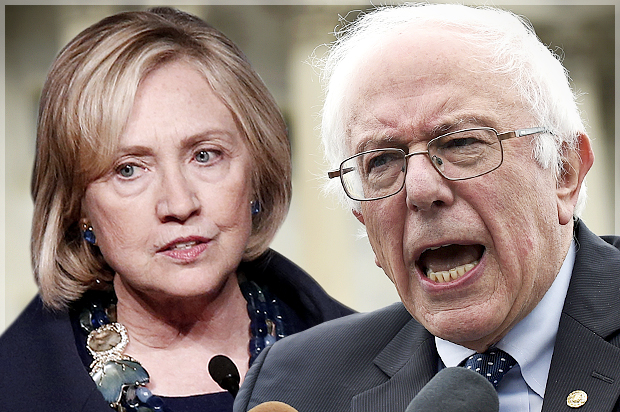In late October, Bernie Sanders called for the end to federal prohibition of marijuana, which would free states to legalize pot (or not) without fear of federal intervention and allow state-legal marijuana businesses to participate in the formal banking system.
“Too many Americans have seen their lives destroyed because they have criminal records as a result of marijuana use,” Sanders told enthusiastic crowd of students at George Mason University. “That’s wrong. That has got to change.”
Sanders’ support for marijuana legalization is a momentous but not very surprising occasion. After all, the majority of Americans now support legalization and it’s no longer fashionable for Democrats to be diehard drug warriors, at least when it comes to pot.
Yet Sanders’ opponent, Hillary Clinton, has not embraced eliminating federal marijuana prohibition.
Instead, she announced on November 7 that she supports watering it down by changing marijuana’s federal classification from a Schedule I to a Schedule II drug. That could make it easier for scientists to research, and could open the door to medical marijuana being regulated by the FDA (and that, as this Brookings paper argues, could actually lead to new restrictions on current state systems).
Clinton has also said that the federal government should not intervene to block states from legalizing.
This has become a predictable campaign season pattern: Clinton moves toward Sanders’ leftist stance on any given issue but does so in an either less convincing or less thoroughgoing manner. In this case, however, Sanders is also a pretty late convert. After all, 58 percent of Americans now support legalization of recreational marijuana, according to Gallup. Supporting marijuana legalization in October 2015 does not make anyone a pathbreaking visionary.
That said, the differences as they now stand between Sanders and Clinton are signficant. Sanders would give a green light to legalization in Colorado, Washington, Alaska, Oregon and Washington D.C., and to the other states that will no doubt soon follow. Clinton’s light is yellow: the schedule change aside, it basically maintains the Obama Administration’s status quo of tolerating state-level legalization but offers nothing in the way of solid, statutory relief.
“Sanders has come out in favor of marijuana legalization and put forth a very substantial position that’s backed up by legislation,” says Michael Collins, speaking for Drug Policy Action, the political arm of the Drug Policy Alliance. “Clinton has been a little bit more slippery on this.”
He calls rescheduling “really a red herring when it comes to marijuana reform.”
Both Clinton and Sanders have criticized the imprisonment of people for marijuana use. In reality, imprisonment for marijuana use is not that common. What is common, however, is marijuana arrests: more than 700,000 last year, mostly for possession. And they disproportionately impact black people. Without legalization or decriminalization, arrests for marijuana users will continue. And they will continue to constitute one of law enforcement’s most persistent violation of civil rights.
Marijuana legalization is a critical but modest move toward ending the drug war. So much of the incarceration and violence caused by prohibition here and throughout the world is caused by the black market for other drugs, and by government efforts to suppress it. Neither candidate responded to a query to explain how they would deal with drugs like heroin. But marijuana legalization is a logical first step. And Bernie Sanders is the only major presidential candidate to support it. It’s something worth discussing at the next debate.
This mashup of Smokey from “Friday” and Bernie Sanders might leave you questioning who is the bigger weed supporter:
[jwplayer file=”http://media.salon.com/2015/11/SandersMarijuana.Asha_.11.12.2015.mp4″ image=”http://media.salon.com/2015/11/BernieSanders-MarijuanaDecrim.jpg”][/jwplayer]


